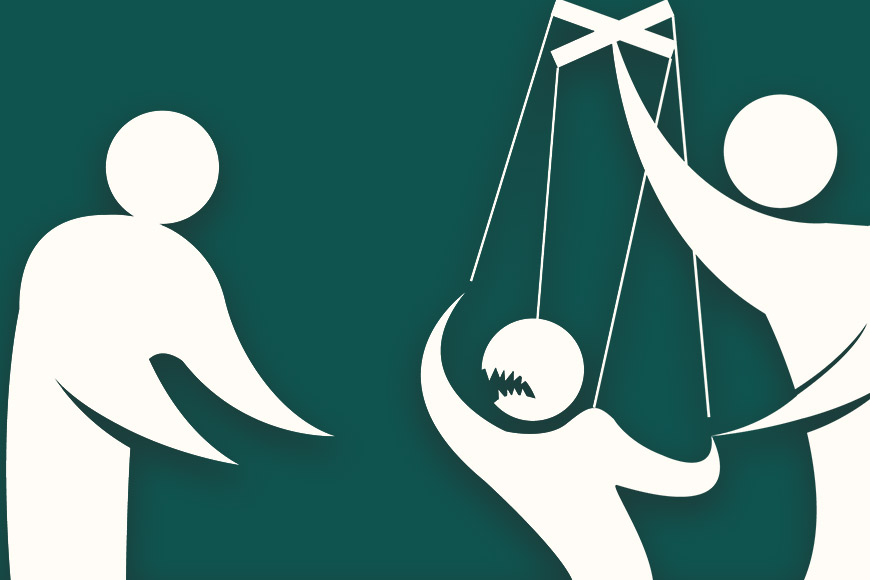When children become weapons for parents

Back in 1985, American child psychiatrist Richard Gardner came up with a term to describe extreme but seemingly unreasonable fear, disrespect or hostility displayed towards one parent by a child (or children), influenced by the other parent, particularly in cases where the parents were estranged. He called it Parental Alienation Syndrome (PAS). Nearly four decades later, as dysfunctional marriages become increasingly commonplace, experts warn that PAS is on the verge of turning into a worldwide epidemic, and demand it be recognised as a form of child abuse, where one parent uses the child as a tool against the other.
In India, Kolkata-based non-profit organisation ‘Ayushman Initiative for Child Rights’ (AICR) is among the few agencies actively campaigning against the long-term impact of PAS on children. Management consultant Arijit Mitra, one of the founding trustees and current secretary of AICR, says their objectives are primarily, “Striving for legal recognition of parental alienation as a form of child abuse; sensitising government agencies and the judiciary in the area of alienation and mental health of alienated children; striving to ensure access of both parents to alienated children as enshrined in the UNCRC (United Nations Convention on the Rights of the Child) guidelines; and sensitising school authorities to ensure access of both parents to children in schools and active participations of both parents in the academic affairs of their children.”
American child psychiatrist Richard Gardner came up with a term to describe extreme but seemingly unreasonable fear, disrespect or hostility displayed towards one parent by a child (or children), influenced by the other parent, particularly in cases where the parents were estranged.
Perhaps the least recognised aspect of PAS is the fact that it can apply to even seemingly happy families in which both parents live under the same roof. If you look around, you will probably see it in your own home, or that of a close friend - instances of children bullying or disrespecting one parent at the instigation of the other, children ‘teaming up’ with one parent against the other, and such behaviour being normalised simply because we are unaware that, by encouraging children to go against one parent, we are actually abusing them and harming their mental health.
In his book ‘Divorce Poison: Protecting the Parent-Child Bond from a Vindictive Ex’, Richard Warshak writes, “The focus here is on those children whose rejection of one parent results primarily from the other parent’s influence. One parent may berate the other parent directly in front of the children, or allow them to overhear put-downs. In some cases the children are exposed to a relentless barrage of harsh criticisms of their other parent. They may be actively encouraged to join in the put-downs. Some unfortunate children are subjected to a deliberate and intensive effort on the part of one parent to alienate them from the other parent.”
Gardner’s original formulation almost exclusively pointed to the mother as the parent to blame, which came in for strong criticism from women’s rights groups. As psychoanalyst Jhuma Basak says, “In our social structure, particularly when it comes to lower and middle income groups, women are most helpless at the basic level, and when a woman has lost her marriage and feels she has been unfairly dealt with, her only weapon is her child, she doesn’t even consider it as abuse. She sees the child as a way of getting back at her in-laws and husband.”
In India, irrespective of the law, custody battles for fathers can often be challenging. While most courts no longer subscribe to the notion that a mother is automatically the primary caregiver, social norms still hold that a child is best looked after by its mother. Saibal Basu is currently involved in just such a custody battle. A founding trustee of AICR with a background in development economics, Basu says, “When you look at Ayushman or similar groups, you are simply seeing the tip of the iceberg, because most people don’t even recognise the problem, just as people did not recognise domestic violence for what it was 30 or 40 years ago. It is only a sustained effort by the government as well as various organisations that have now given people an idea.”
In his book ‘Divorce Poison: Protecting the Parent-Child Bond from a Vindictive Ex’, Richard Warshak writes, “The focus here is on those children whose rejection of one parent results primarily from the other parent’s influence. One parent may berate the other parent directly in front of the children, or allow them to overhear put-downs.
The root of the problem is that child rights are not a legitimate concern for most of us. As Basu says, there is a tendency to not treat children as independent citizens. “Simply the fact of giving birth to a child often makes us treat that child as an extension of ourselves, rather than as a separate individual who may be very different from us. We are brought up in a familial structure that teaches us almost nothing about the very concept of rights - whether it is child rights or human rights. And when parents are estranged, this problem is severely aggravated.”
When it comes to the mental health of a child facing PAS, says consultant psychologist Dr Anuttama Banerjee, “I seriously believe that it is better to separate rather than bring up children in a bitter environment where the parents are constantly arguing or worse. However, many adults have come to me seeking help about the resentment they feel at having been kept apart from one parent by the other parent as children. In this scenario, after a point, the parent who alienates the child from the other parent can become an object of anger.”
Another way of damaging a child’s psyche is to negatively compare her/him with the absent parent. “Telling a child ‘You’re just like your father/mother’ kills them inside. They cannot understand why they are being compared to a parent who is obviously disliked. This is something we need to be very careful about and explain to the child that just because the parents don’t get along doesn’t mean that either of them is a bad person,” says Dr Banerjee.
The biggest fallout, says Basak, is that children subjected to PAS grow up with a love and trust deficit. “They can’t find an anchor, and try to please both parents, almost as if it is their functional duty to maintain passivity among the two. Later on, when they themselves build relationships, they seek the anchor that they never had as children, and that often comes across as a desire to acquire control over the loved one, or overly possessive behaviour, which causes severe problems within the relationship,” she says.
Given the scenario, Ayushman has been liaising with the National Commission for Protection of Child Rights (NCPCR) and various State Commissions for Protection of Child Rights (SCPCRs) to ensure the welfare of children of estranged couples, and preventing the mental abuse of children through PAS. There is also a battle to gain legal recognition for the problem, and efforts to make the relevant government agencies research parental alienation and its ill effect on children of estranged couples. A long road lies ahead, but the more society appreciates the seriousness of the problem, the more the chances that the courts will, too.










